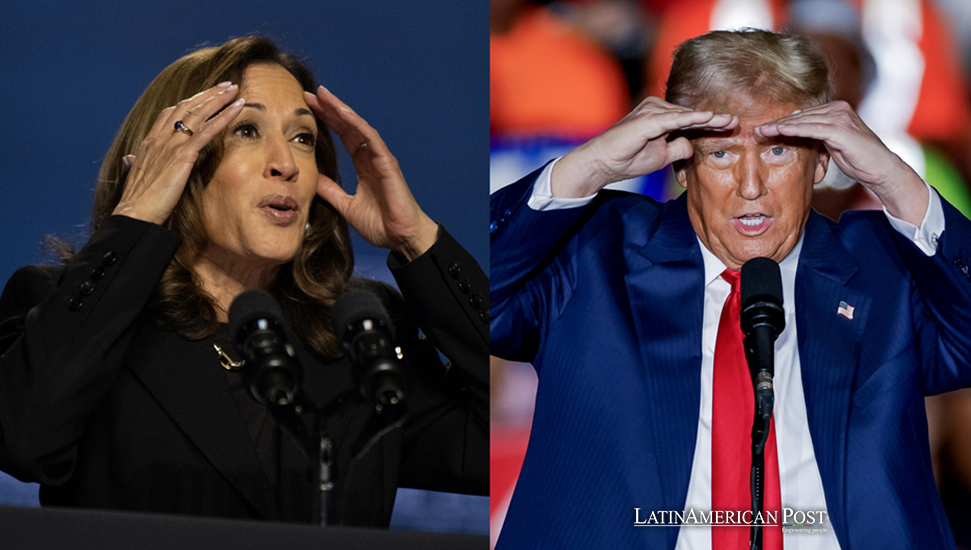Latin America on Edge: Trump vs. Harris and Economic Volatility

Latin America is nervously awaiting the U.S. presidential election on Nov. 5, as a potential second term for Donald Trump could bring renewed volatility to the region. A win by Vice President Kamala Harris may offer more stability and fewer economic risks.
Election Jitters in Latin America
Latin America is anxiously counting down to Nov. 5, when U.S. voters will decide between Vice President Kamala Harris, representing relative continuity, or Donald Trump, who could revive the policies that shook the region’s largest markets and economies during his first presidency. Reuters reports that Latin America is particularly vulnerable to shifts in U.S. trade and monetary policies, given its proximity and economic dependence.
The most significant factors are trade relations, particularly with Mexico, and the potential impact of U.S. monetary policy on global interest rates. Continuing Trump’s economic confrontation with China could benefit countries like Brazil, but Mexico might be precarious. If reignited, Trump’s trade war with China could intensify regional volatility, particularly for economies heavily linked to U.S. trade.
As emerging markets, strategist Carlos de Sousa told Reuters, “A trade war with China would likely intensify under a Trump presidency. I think the most affected country in Latin America could be Mexico.” Mexico, the U.S.’s largest trading partner in the region, could face tighter scrutiny, particularly regarding its automotive sector and the stringent “rules of origin” for vehicles.
De Sousa added, “We could see a return to a more volatile period for Mexican assets, similar to what we witnessed during Trump’s first term.” For many in the region, a second Trump administration brings the prospect of economic turbulence, especially with the looming renegotiation of the U.S.-Mexico-Canada Agreement (USMCA) in 2026.
Trade Wars and Tariff Risks
China remains a central figure in this scenario. Harris’s approach to trade, maintaining current tariffs on China, is seen as more measured than Trump’s aggressive stance. Trump has threatened to increase tariffs on Chinese goods, potentially causing significant disruptions for economies like Mexico that rely heavily on imports and exports.
A recent note from Lazard warns that Trump’s proposed universal 10% tariff could be used to prevent countries from skirting tariffs by establishing factories in U.S. trade partners. This move could have far-reaching consequences for the Mexican economy, especially in the automotive sector, where Trump has suggested tariffs as high as 200% on Mexican-made vehicles.
In contrast, South American economies that are less reliant on manufacturing and more dependent on commodity exports might easily weather a potential Trump trade storm. Countries like Chile, which has a strong position in copper and lithium exports, could be largely insulated. As Lazard explains in their client note, “Chile’s high exposure to the U.S. market, particularly in copper and lithium, means it may largely escape the more severe consequences of Trump’s tariffs.”
Reuters’ analysis suggests that Harris would likely reduce overall tariff risks, leading to more stable growth for emerging markets in Latin America. According to Lazard’s October outlook for emerging markets, “If Harris wins, with a likely divided government, tariff risk would decline, which could lead to sustained outperformance of emerging market assets.” A Harris administration may boost commodity-driven economies like Brazil and Argentina, even as Mexico faces lingering uncertainties.
Remittance Tax and Central America’s Challenges
One of the most worrying aspects of a potential Trump victory is the possibility of a 10% tax on remittances, a policy idea championed by U.S. Senator JD Vance, Trump’s running mate. This tax would hit Central American countries like Honduras and El Salvador, where remittances make up more than 20% of GDP.
The impact of such a policy would be devastating, stripping these economies of billions of dollars in vital financial support. Based on 2023 figures, Mexico, the largest recipient of remittances in the region, could see inflows drop by over $6 billion annually. For Central America, which is already struggling with weak economies, this could mean the loss of critical economic lifelines.
Reuters spoke to economists who warned of the ripple effects on the region. “A tax on remittances would effectively amount to a few percentage points of GDP loss per year for countries like Honduras and El Salvador,” said Francisco Campos, chief economist for Latin America at Deutsche Bank. “The effect would be less severe in Mexico in relative terms, but it would still represent a significant financial hit.”
On the other hand, South American countries like Brazil and Argentina, which are less reliant on remittances, could emerge from this scenario relatively unscathed. Brazil’s robust trade relationship with China could benefit further as China seeks to replace U.S. goods with Brazilian exports, particularly in the agriculture sector. “There can be a tariff outcome that helps Latin America if, as a result of a tit-for-tat dynamic, China redirects purchases of primary products away from the U.S. into other suppliers like Brazil and Argentina,” Alejo Czerwonko of UBS Global Wealth Management told Reuters.
Monetary Policy, Inflation, and Economic Impact
Trump’s potential return to the White House would likely cause ripples in the global economy, with Latin America feeling the consequences of tighter U.S. monetary policy. During Trump’s first term, his administration’s tax cuts and spending increases ballooned the U.S. budget deficit. A second Trump administration would likely repeat this pattern, potentially driving U.S. interest rates higher and causing tighter financial conditions globally.
Emerging markets like Latin America are susceptible to changes in U.S. monetary policy, as higher U.S. interest rates often lead to capital outflows from emerging markets. “If Trump wins and deficits are larger, the disinflation process could be slower,” De Sousa explained. “That could translate into a slightly slower monetary policy easing, impacting emerging market assets, including those in Latin America.”
A Harris victory, by contrast, is expected to result in a more balanced approach to fiscal policy, leading to slower increases in interest rates. Latin American countries, which are still grappling with the economic fallout from the COVID-19 pandemic, would welcome this. Lazard’s October outlook states, “Lower U.S. growth and investment conditions under Harris could lead to sustained outperformance of emerging market assets, including those in Latin America.”
Argentina’s Milei and Trump’s Influence
Argentina’s President Javier Milei, a populist leader who is often compared to Trump, could find his administration benefiting from a Trump win. Both leaders share similar abrasive styles, and Milei has publicly supported Trump. A renewed Trump administration could see Argentina gaining U.S. support as it seeks to renegotiate its loan program with the International Monetary Fund (IMF), where the U.S. holds significant influence.
Francisco Campos noted, “Because of the ideological affinity and similar governing style between Milei and Trump, maybe Argentina could find itself with a little tailwind under a Trump scenario.” This could give Argentina some leverage as it seeks to extend or renew its IMF loan program, which is crucial for stabilizing its economy.
However, the broader risks of a Trump victory could outweigh any potential benefits for Argentina. A return to Trump’s aggressive trade policies and the possibility of higher U.S. interest rates could complicate Milei’s efforts to stabilize the country’s economy.
Also read: Mexico’s Industrial Parks Boom As Nearshoring Surges
The upcoming U.S. election holds significant consequences for Latin America. A second Trump administration could reignite volatility in the region, particularly in Mexico and Central America. On the other hand, a Harris victory might offer more stability and lower the risks of economic disruption, benefiting emerging markets across the region.





